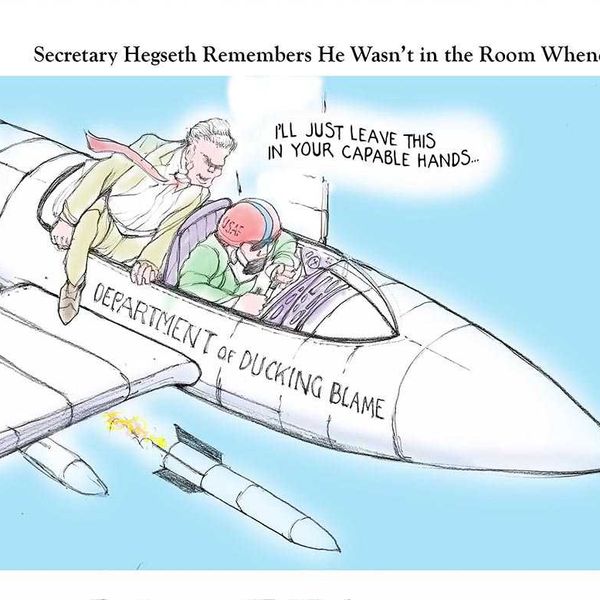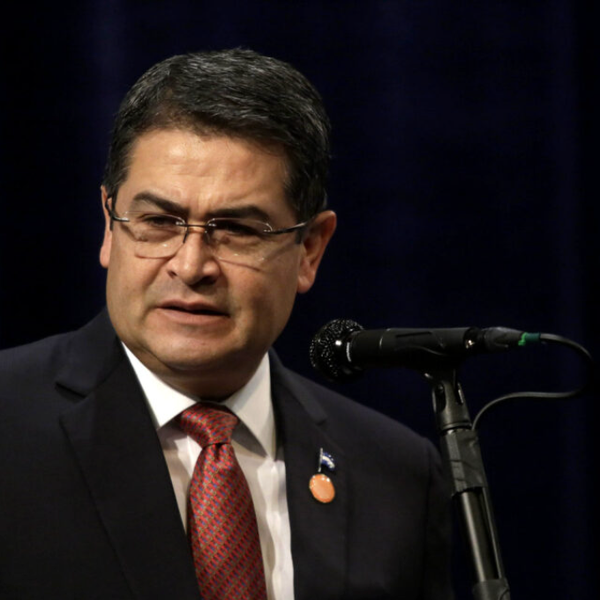Trump Would Sell Off America’s Energy Resources For A Pittance, Like Russia Did To Create Its Oligarchs

Reprinted with permission from Alternet.
President Trump’s 2018 budget and executive orders could lead to some of the biggest land grabs since America’s Teapot Dome scandal in the 1920s and Russia’s natural resource giveaways that created many oligarchs in the 1990s.
When looking at his budget for the Department of Energy and Department of the Interior—which oversee leases for oil, gas and mining, and own interstate electric transmission lines—Trump would set the stage for a return of the robber barons.
The Teapot Dome—which historians say was America’s biggest scandal until Watergate—involved an insider deal over leasing Navy petroleum reserves for a pittance. Russia’s oligarchs, who include investors in Trump buildings, are seen as getting super rich by acquiring the former Soviet Union’s assets, especially energy and mineral resources, similarly for cheap. They privatized what were once public assets to make fortunes.
Fast-forward to Trump, who, true to his background as a real estate developer, sees untapped equity in trillions of dollars in government-held energy and mineral resources as a way to pay down the federal debt and an opportunity to enrich private-sector friends—including America’s biggest corporations.
While there’s been a chorus of “No way” from Republicans over some areas of Trump’s budget, look at what he’s proposed. (This comes after executive orders opening up oil and gas drilling, including in the Arctic Ocean.) Trump’s budget says that $36 billion could be raised over the next decade by selling off resources (such as half the Strategic Petroleum Reserve) and infrastructure (power transmission lines across nearly 20 Western states), opening public lands for drilling and mining, and rescinding oil-and-gas revenues given to four Gulf of Mexico states. (That’s where Republicans balk.)
The Teapot Dome scandal emerged when Naval petroleum reserves were grabbed in a no-bid process. While that’s not likely to recur today, the 270 billion barrels of oil in the Strategic Petroleum Reserve are now valued at a comparatively low rate, about $51 per barrel. In the last decade, “Prices have bounced from $140/bbl to as low as $27/bbl,” reported Oil and Gas Journal, a trade publication. Even the slightest hint of energy shortages or international crises causes prices to jump. That suggests whoever gets the reserve oil would reap a windfall.
Like the post-Soviet Union giveaways, there are other opportunities buried in Trump’s budget. Line item privatization schemes include “divesting,” or selling, transmission lines held by the Southwestern Power Administration, Bonneville Power Administration and Western Area Power Administration, which are all government agencies. That would bring in about $10 billion over a decade, his budget analysis said. Sen. Maria Cantwell, D-Washington, told the New York Times, “Selling government-owned transmission lines to the highest bidder will just have the effect of jacking up power rates.”
There are other public giveaways embedded in spending categories. The Interior Department’s budget doesn’t merely cut all funds for cleaning up abandoned mines. It wants to open up federal lands to mining and drilling by pouring multimillions into “oil, gas and coal investments on public lands,” the Washington Post reported.
“Onshore fossil fuel programs would receive $189 million annually, an increase of $24 million; offshore programs would get $343 million, including a $10 million increase to update the nation’s five-year offshore drilling plan,” the Post said. “The Bureau of Land Management would get a $16 million increase in its oil and gas management program to accelerate the rate at which its staff processes permit applications and addresses right-of-way requests for infrastructure projects.”
Trump would also like to open up the Arctic to oil and gas leases, but that is trickier than his orders and budget suggest. Even though he signed executive orders, Congress has to approve any new exploration in the Arctic. There also are hurdles to drilling in marine sanctuaries. Interior Secretary Ryan Zinke said it could take two years to inventory the lands to be auctioned. (His department manages 530 million acres, or one-fifth of the U.S., the Post noted, and “even more [mineral] resources underground.”)
There is no shortage of cheerleaders in investment circles hoping for access to energy and mineral rights. As MarketWatch wrote in late March: “Think the feds are broke? Not so fast, says a 2013 report from the Institute for Energy Research, which points out that… mineral rights for oil and gas reserves… are worth $128 trillion. But that was January 2013. Even though oil prices US:CLK7 have dropped 50% and gas prices US:NGK17 have fallen some 15% since, that’s still, as Donald Trump might say, a yuge amount of money.” That MarketWatch report noted that the first big deal done by ExxonMobil’s new CEO (after Rex Tillerson became Secretary of State) was “a shale oil bet valued at up to $6.6 billion in January in the Permian Basin region of Texas and New Mexico.”
So, unlike Russia after the Soviet Union broke up, it may be corporations more than single investors who stand to benefit from Trump’s plans. But like Russia’s oligarchs, the path to great wealth comes via grabbing public resources—a robber baron narrative that Trump’s orders and first proposed federal budget would like to repeat.
Historians Sergei Guriev and Andrei Rachinsky wrote about how Russian oligarchs used public resources and insider deals to acquire their wealth in a 2005 scholarly article, “The Role of Oligarchs in Russian Capitalism.” While it describes Russia in the 1990s, it is not very far from what Trump would do with America’s public energy and mineral assets.
“The oligarchs’ wealth was accumulated with a substantial support from the state (in the form of direct subsidies, tax breaks, land grants, subsidized credit and the like),” the two historians wrote, “and was deemed illegitimate by a substantial share of the public at some points in history.”
Steven Rosenfeld covers national political issues for AlterNet, including America’s democracy and voting rights. He is the author of several books on elections and the co-author of Who Controls Our Schools: How Billionaire-Sponsored Privatization Is Destroying Democracy and the Charter School Industry (AlterNet eBook, 2016).
This article was made possible by the readers and supporters of AlterNet.








